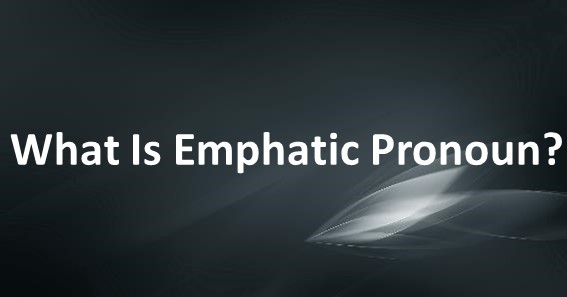Are you curious to know what is emphatic pronoun? You have come to the right place as I am going to tell you everything about emphatic pronoun in a very simple explanation. Without further discussion let’s begin to know what is emphatic pronoun?
Language is a fascinating tool that allows us to convey our thoughts, emotions, and intentions. In the realm of grammar, pronouns play a vital role in replacing nouns and making our speech and writing more concise. One type of pronoun that adds emphasis, power, and intensity to our language is known as an emphatic pronoun. In this blog post, we will explore what an emphatic pronoun is, how it functions, and the impact it has on our communication.
What Is Emphatic Pronoun?
An emphatic pronoun is a special type of pronoun used to emphasize or intensify a noun or pronoun in a sentence. It serves to draw attention, add emphasis, or provide extra weight to the subject or object. Emphatic pronouns are formed by adding the suffix “-self” to certain pronouns, depending on the person and gender.
Common Examples:
The most commonly used emphatic pronouns include:
- Myself
- Yourself
- Himself
- Herself
- Itself
- Ourselves
- Yourselves
- Themselves
Function And Usage:
Emphatic pronouns serve several important functions in language:
- Emphasis: Emphatic pronouns are primarily used to add emphasis and intensify the subject or object of a sentence. They draw attention to a particular person or thing, highlighting its significance or importance.
Example: “I will do it myself.” (The use of “myself” emphasizes that the speaker will personally undertake the task, showcasing determination and self-reliance.)
- Contrast and Clarification: Emphatic pronouns can be employed to create contrast or clarification between different individuals or entities, particularly in situations where there might be ambiguity.
Example: “John baked the cake himself, not his sister.” (The use of “himself” clarifies that John, and not someone else, baked the cake, emphasizing his personal effort.)
- Reflexive Actions: Emphatic pronouns are used when the subject of a sentence performs an action on itself.
Example: “She looked at herself in the mirror.” (The use of “herself” indicates that she viewed her own reflection, adding emphasis to the act of self-observation.)
- Reciprocal Actions: Emphatic pronouns can express reciprocal actions between two or more individuals.
Example: “They praised themselves for their achievements.” (The use of “themselves” indicates that each person praised the others, emphasizing mutual appreciation.)
- Intensification: Emphatic pronouns are also utilized to intensify or strengthen the meaning of a sentence, adding extra impact or significance.
Example: “The storm itself was terrifying.” (The use of “itself” emphasizes the intensity and impact of the storm, underscoring its frightening nature.)
Conclusion:
Emphatic pronouns are powerful linguistic tools that allow us to add emphasis, power, and intensity to our language. Whether used to draw attention, create contrast, clarify ambiguity, express reciprocal actions, or intensify meaning, emphatic pronouns contribute to effective communication and make our speech and writing more impactful. By understanding the role and usage of emphatic pronouns, we can harness their expressive potential and elevate the impact of our words.
Let’s find some more interesting topics like these here askcorran
FAQ
What Is An Emphatic Pronoun And Examples?
An emphatic pronoun is a pronoun such as myself, herself, yourself, etc., that is used immediately after the noun to which it refers in order to show emphasis.
What Is An Example Of An Empathetic Pronoun?
Myself, yourself, herself, himself, himself, itself, ourselves, yourselves, and themselves are the emphatic pronouns. These terms can be either emphatic or reflexive pronouns. Read on and have a look at a few examples; William himself informed me all these.
What Is Difference Between Reflexive And Emphatic Pronouns?
Reflexive pronouns serve as the object of a transitive verb when the object is the same person or thing as the subject (e.g., ‘I believe in myself’). Emphatic pronouns (also called intensive pronouns) are used in combination with another noun or pronoun to place special emphasis on it (‘I myself wrote the code’).
What Are 5 Examples Of Emphasizing Pronoun?
The English emphatic pronouns are myself, ourselves, yourself, yourselves, himself, herself, itself, themselves, and oneself.
Where Is Emphatic Pronoun Used?
We use it in cleft sentences. It emphasises the subject or object of the main clause: It was his sister who ran the marathon in New York, wasn’t it? Was it the printer that caused the problem?
I Have Covered All The Following Queries And Topics In The Above Article
What Is Emphatic Pronoun
What Is Emphatic Pronoun With Example
What Is The Meaning Of Emphatic Pronoun
What Is A Emphatic Pronoun
What Is Emphatic Pronoun And Examples
What Is Emphatic Pronoun
What is emphatic pronoun?







